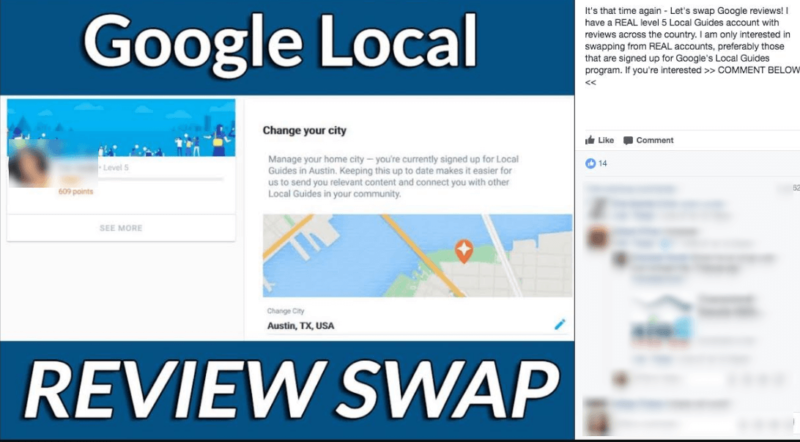What are the risks for businesses that are getting fake reviews on Google?
Creating fake reviews might seem like a great way to boost your business's local profile, but columnist Joy Hawkins warns that the consequences far outweigh the benefits. After all, you're not just violating Google's guidelines -- you're breaking the law.
Recently, someone emailed me some information about a private Facebook group run by an SEO company in Austin, Texas, that is encouraging businesses to “swap reviews” on Google. In the post, the SEO company owner said:
“It’s that time again – Let’s swap Google reviews! I have a REAL level 5 Local Guides account with reviews across the country. I am only interested in swapping from REAL accounts, preferably those that are signed up for Google’s Local Guides program. If you’re interested >> COMMENT BELOW.”
In the group, people are commenting with their profiles and indicating that they’re a Level 5-7 on the Google Local Guides program. This group was reported to Google weeks ago, but as of this writing, the profiles are all active.
Although what these people are doing is against Google’s guidelines, Google has yet to take action on tons of the massive networks I’ve sent in — and I anticipate it will take some time before they start cracking down on these users leaving fake reviews. Currently, what I see is that Google removes the reviews (sometimes) when they are reported but doesn’t do enough to keep the user from leaving more.
In addition to getting the reviews removed and getting in trouble with Google, what other risks do people take when leaving or accepting fake reviews?
Risks for the SEO company
The SEO company that is promoting this practice of leaving reviews is taking a couple of big risks in doing so.
The first risk is with their online reputation. I looked at the reviews of the SEO company behind this, and they have had several negative reviews on their Google listing recently from people calling them out on their other fabricated five-star reviews.
The second risk would be on the legal end. In New York, 19 SEO companies were fined for being involved in writing and posting fake reviews. Matt Staub, an attorney at Pasha Law PC, stated the following:
“SEO companies can be vague in how they offer reputation management services, so they may not technically be violating their agreement with their clients. That being said, they can still be liable for legal claims such as unfair competition.”
Risks for the small business owner
The businesses that are participating in these types of reviews are also taking risks. Although they are participating thinking that it will get their business positive reviews, it can easily backfire.
Just as I saw with the SEO company behind this initiative, the business owners participating are being attacked with negative reviews. One of the people in the group even warned that some users volunteering to do review swaps are actually leaving negative one-star reviews on the listings, clarifying that the business owner is soliciting fake reviews.
On the legal end, small businesses have also faced lawsuits for fake reviews, like this car dealer who was fined $3.6 million. Attorney Charles Lee Mudd, Jr., of Mudd Law clarifies the risks a business owner is taking when participating in this type of thing:
“First, it will knowingly be publishing fraudulent information about its products and services. I see this violating both state and federal consumer protection and deceptive trade practices laws. It also exposes them to a massive class action suit by hungry attorneys looking for those who violate the statutes that provide for recovery of attorneys fees and costs. It may also open up competitors to file suit.”
Brandon J. Huffman, attorney at Odin Law, also points out that businesses doing this are at risk for FTC enforcement:
“The FTC looks at whether you got something of value in exchange for your review. The thing of value is usually cash or a free product of some kind, but the positive review you receive is also something of value. So, this is really no different than a typical paid-for review under the regulations. Businesses would need to disclose that they received a positive review in exchange for their positive review.”
The FTC FAQ page on this can be seen here.
Just say no to fake reviews
For business owners reading this, please consider the long-term consequences of participating in this activity. Think of how much your business means to you, and what you could lose very quickly if your potential prospects realize you are lying to them.
Opinions expressed in this article are those of the guest author and not necessarily Search Engine Land. Staff authors are listed here.
Related stories
New on Search Engine Land

